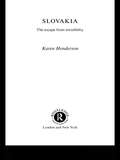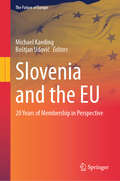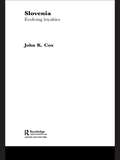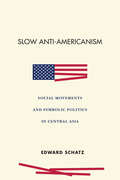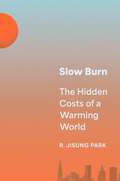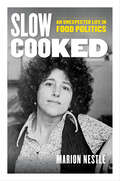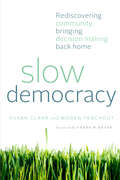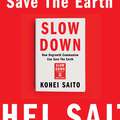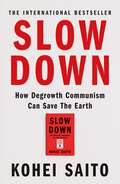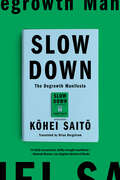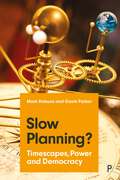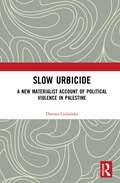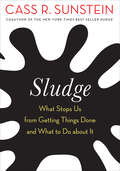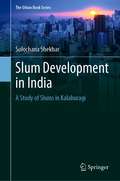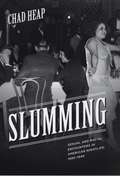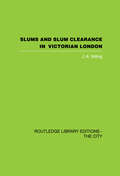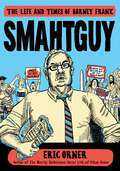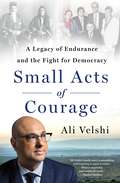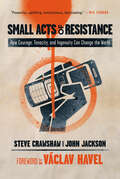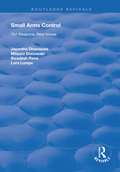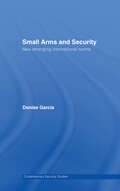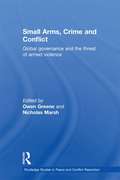- Table View
- List View
Slovakia: The Escape from Invisibility (Postcommunist States and Nations)
by Karen HendersonSince Slovakia achieved independent statehood at the end of 1992 it has become one of the most prosperous post-communist states. This book provides a unique and thorough introduction to Slovakia and will enable the reader to understand its multi-faceted nature. The book includes chapters on Twentieth Century History, Politics, Economy and International Relations.
Slovenia and the EU: 20 Years of Membership in Perspective (The Future of Europe)
by Michael Kaeding Boštjan UdovičThis book addresses a range of aspects essential to a better understanding of Slovenia's 20 years in the EU and its exposure to the European integration process, including changes to its policies on e.g. competitiveness, industry, innovation, foreign policy and diplomacy, security and defense, but also its relations to neighboring countries, its experience with European elections, and different forms of Euroscepticism and citizens' trust in EU institutions. Subsequent chapters explore how Slovenia has been coping with the Maastricht criteria and EU law more generally in its polities and politics, benefitting from EU funds, and defending its language as an official language of the EU. In concise contributions, the authors – with diverse scholarly backgrounds and hailing from Slovenia and abroad – assess these aspects and share their perspectives on Slovenia's experiences after 20 years of full EU membership.
Slovenia: Evolving Loyalties (Postcommunist States and Nations #Vol. 18)
by John K. CoxA clear and concise introduction to contemporary Slovenia. It examines the country's rapid transition from a collection of provinces in the southern part of the Habsburg Empire, to a republic within Yugoslavia, to an independent state and analyzes the major political and economic developments since 1991. The perfect introduction to one of Europe's most fascinating nations.
Slow Anti-Americanism: Social Movements and Symbolic Politics in Central Asia
by Edward SchatzNegative views of the United States abound, but we know too little about how such views affect politics. Drawing on careful research on post-Soviet Central Asia, Edward Schatz argues that anti-Americanism is best seen not as a rising tide that swamps or as a conflagration that overwhelms. Rather, "America" is a symbolic resource that resides quietly in the mundane but always has potential value for social and political mobilizers. Using a wide range of evidence and a novel analytic framework, Schatz considers how Islamist movements, human rights activists, and labor mobilizers across Central Asia avail themselves of this fact, thus changing their ability to pursue their respective agendas. By refocusing our analytic gaze away from high politics, he affords us a clearer view of the slower-moving, partially occluded, and socially embedded processes that ground how "America" becomes political. In turn, we gain a nuanced appreciation of the downstream effects of US foreign policy choices and a sober sense of the challenges posed by the politics of traveling images. Most treatments of anti-Americanism focus on politics in the realm of presidential elections and foreign policies. By focusing instead on symbols, Schatz lays bare how changing public attitudes shift social relations in politically significant ways, and considers how changing symbolic depictions of the United States recombine the raw material available for social mobilizers. Just like sediment traveling along waterways before reaching its final destination, the raw material that constitutes symbolic America can travel among various social groups, and can settle into place to form the basis of new social meanings. Symbolic America, Schatz shows us, matters for politics in Central Asia and beyond.
Slow Burn: The Hidden Costs of a Warming World
by R. Jisung ParkHow the subtle but significant consequences of a hotter planet have already begun—from lower test scores to higher crime rates—and how we might tackle them todayIt&’s hard not to feel anxious about the problem of climate change, especially if we think of it as an impending planetary catastrophe. In Slow Burn, R. Jisung Park encourages us to view climate change through a different lens: one that focuses less on the possibility of mass climate extinction in a theoretical future, and more on the everyday implications of climate change here and now.Drawing on a wealth of new data and cutting-edge economics, Park shows how climate change headlines often miss some of the most important costs. When wildfires blaze, what happens to people downwind of the smoke? When natural disasters destroy buildings and bridges, what happens to educational outcomes? Park explains how climate change operates as the silent accumulation of a thousand tiny conflagrations: imperceptibly elevated health risks spread across billions of people; pennies off the dollar of productivity; fewer opportunities for upward mobility.By investigating how the physical phenomenon of climate change interacts with social and economic institutions, Park illustrates how climate change already affects everyone, and may act as an amplifier of inequality. Wealthier households and corporations may adapt quickly, but, without targeted interventions, less advantaged communities may not.Viewing climate change as a slow and unequal burn comes with an important silver lining. It puts dollars and cents behind the case for aggressive emissions cuts and helps identify concrete steps that can be taken to better manage its adverse effects. We can begin to overcome our climate anxiety, Park shows us, when we begin to tackle these problems locally.
Slow Cooked: An Unexpected Life in Food Politics (California Studies in Food and Culture #78)
by Marion NestleMarion Nestle reflects on her late-in-life career as a world-renowned food politics expert, public health advocate, and a founder of the field of food studies after facing decades of low expectations. In this engrossing memoir, Marion Nestle reflects on how she achieved late-in-life success as a leading advocate for healthier and more sustainable diets. Slow Cooked recounts of how she built an unparalleled career at a time when few women worked in the sciences, and how she came to recognize and reveal the enormous influence of the food industry on our dietary choices. By the time Nestle obtained her doctorate in molecular biology, she had been married since the age of nineteen, dropped out of college, worked as a lab technician, divorced, and become a stay-at-home mom with two children. That's when she got started. Slow Cooked charts her astonishing rise from bench scientist to the pinnacles of academia, as she overcame the barriers and biases facing women of her generation and found her life's purpose after age fifty. Slow Cooked tells her personal story—one that is deeply relevant to everyone who eats, and anyone who thinks it's too late to follow a passion.
Slow Democracy: Rediscovering Community, Bringing Decision Making Back Home
by Susan Clark Woden TeachoutReconnecting with the sources of decisions that affect us, and with the processes of democracy itself, is at the heart of 21st-century sustainable communities.Slow Democracy chronicles the ways in which ordinary people have mobilized to find local solutions to local problems. It invites us to bring the advantages of "slow" to our community decision making. Just as slow food encourages chefs and eaters to become more intimately involved with the production of local food, slow democracy encourages us to govern ourselves locally with processes that are inclusive, deliberative, and citizen powered.Susan Clark and Woden Teachout outline the qualities of real, local decision making and show us the range of ways that communities are breathing new life into participatory democracy around the country. We meet residents who seize back control of their municipal water systems from global corporations, parents who find unique solutions to seemingly divisive school-redistricting issues, and a host of other citizens across the nation who have designed local decision-making systems to solve the problems unique to their area in ways that work best for their communities.Though rooted in the direct participation that defined our nation's early days, slow democracy is not a romantic vision for reigniting the ways of old. Rather, the strategies outlined here are uniquely suited to 21st-century technologies and culture.If our future holds an increased focus on local food, local energy, and local economy, then surely we will need to improve our skills at local governance as well.
Slow Down: How Degrowth Communism Can Save the Earth
by Kohei SaitoWill green capitalism save the planet? Is it even trying?Not when the very logic of the capitalist system pits it against Earth's life-support systems, as the Japanese philosopher Kohei Saito demonstrates in this astonishing international bestseller.Drawing on cutting-edge research across multiple disciplines, Saito shows how nothing but a transformation of our economic life can save us from climate collapse. Karl Marx himself reached this breakthrough at theend of his life, long before climate change had even begun. It radically altered his vision of proletarian revolution. Now that we are entering our own end-game, we must grasp Marx's final lesson before it is too late.If we are to avoid the most terrible political prospects of of climate change, the future must belong to degrowth communism, a fair and humane existence within the limits of nature. There is no alternative: the endlessacceleration of capital has run out of road. We must slow down.
Slow Down: How Degrowth Communism Can Save the Earth
by Kohei SaitoWill green capitalism save the planet? Is it even trying?Not when the very logic of the capitalist system pits it against Earth's life-support systems, as the Japanese philosopher Kohei Saito demonstrates in this astonishing international bestseller.Drawing on cutting-edge research across multiple disciplines, Saito shows how nothing but a transformation of our economic life can save us from climate collapse. Karl Marx himself reached this breakthrough at theend of his life, long before climate change had even begun. It radically altered his vision of proletarian revolution. Now that we are entering our own end-game, we must grasp Marx's final lesson before it is too late.If we are to avoid the most terrible political prospects of of climate change, the future must belong to degrowth communism, a fair and humane existence within the limits of nature. There is no alternative: the endlessacceleration of capital has run out of road. We must slow down.
Slow Down: The Degrowth Manifesto
by KOHEI SAITO"[A] well-reasoned and eye-opening treatise . . . [Kohei Saito makes] a provocative and visionary proposal." —Publishers Weekly, (starred review)"Saito&’s clarity of thought, plethora of evidence, and conversational, gentle, yet urgent tone . . . are sure to win over open-minded readers who understand the dire nature of our global. . . . A cogently structured anti-capitalist approach to the climate crisis." —Kirkus Reviews (starred review)Why, in our affluent society, do so many people live in poverty, without access to health care, working multiple jobs and are nevertheless unable to make ends meet, with no future prospects, while the planet is burning?In his international bestseller, Kohei Saito argues that while unfettered capitalism is often blamed for inequality and climate change, subsequent calls for &“sustainable growth&” and a &“Green New Deal&” are a dangerous compromise. Capitalism creates artificial scarcity by pursuing profit based on the value of products rather than their usefulness and by putting perpetual growth above all else. It is therefore impossible to reverse climate change in a capitalist society—more: the system that caused the problem in the first place cannot be an integral part of the solution. Instead, Saito advocates for degrowth and deceleration, which he conceives as the slowing of economic activity through the democratic reform of labor and production. In practical terms, he argues for:the end of mass production and mass consumptiondecarbonization through shorter working hours the prioritization of essential labor over corporate profitsBy returning to a system of social ownership, he argues, we can restore abundance and focus on those activities that are essential for human life, effectively reversing climate change and saving the planet.
Slow Planning?: Timescapes, Power and Democracy
by Gavin Parker Mark DobsonA deep exploration on how questions of time and its organisation affect planning practice, this book questions ‘project speed’: where time to think, deliberate and plan has been squeezed. The authors demonstrate the many benefits of slow planning for the key participants, multiple interests and planning system overall.
Slow Urbicide: A New Materialist Account of Political Violence in Palestine
by Dorota GolańskaThe book presents a new materialist understanding of acts of deliberate destruction of the built environment and, specifically, of the politics of aggressive spatial containment and regularization of urbanity employed within the conflict in Israel/Palestine. Building on recent scholarship on slow violence and urbicidal policies, it discusses the different dimensions of the violence against the urban space, as well as exposes the complex material-semiotic character of the urban territory and of its destruction. By referring to the concepts of “ethno-territoriality” and “the right to the city,” the book aims to generate an enhanced understanding of problems situated at the overlap of urban studies and investigations of state-sponsored violence, focusing specifically on issues related to urban warfare. Adopting a new materialist perspective, the book is a searing examination of political violence in our times. The volume will be of great interest to scholars and researchers of political science, international relations, cultural studies, and urban studies. It will also appeal to NGO professionals and activists across the world.
Sludge: What Stops Us from Getting Things Done and What to Do about It
by Cass R. SunsteinHow we became so burdened by red tape and unnecessary paperwork, and why we must do better.We've all had to fight our way through administrative sludge--filling out complicated online forms, mailing in paperwork, standing in line at the motor vehicle registry. This kind of red tape is a nuisance, but, as Cass Sunstein shows in Sludge, it can also also impair health, reduce growth, entrench poverty, and exacerbate inequality. Confronted by sludge, people just give up--and lose a promised outcome: a visa, a job, a permit, an educational opportunity, necessary medical help. In this lively and entertaining look at the terribleness of sludge, Sunstein explains what we can do to reduce it. Because of sludge, Sunstein, explains, too many people don't receive benefits to which they are entitled. Sludge even prevents many people from exercising their constitutional rights--when, for example, barriers to voting in an election are too high. (A Sludge Reduction Act would be a Voting Rights Act.) Sunstein takes readers on a tour of the not-so-wonderful world of sludge, describes justifications for certain kinds of sludge, and proposes "Sludge Audits" as a way to measure the effects of sludge. On balance, Sunstein argues, sludge infringes on human dignity, making people feel that their time and even their lives don't matter. We must do better.
Slum Development in India: A Study of Slums in Kalaburagi (The Urban Book Series)
by Sulochana ShekharThis book is an earnest effort in understanding the slums and their needs by taking a case study of Kalaburagi, India. This study aims to contribute sustainable methodologies to advance the living conditions of slum dwellers and for better execution of slum policies. The core objectives are: 1) mapping the existing slums of Kalaburagi (formerly Gulbarga) city using slum ontology from very high-resolution data and validating the slum map through ground survey and using reliable data; 2) developing a model to understand the factors which are responsible for the present growth as well as to predict the future growth of slums; 3) estimating the housing demand of urban poor and suggesting a suitable site for the rehabilitation program; and 4) suggestions for the better intervention of government policies with special reference to in-situ program.Urban is the future, and slums are its reality. Sustainable development goals are directly and indirectly concerned about the increasing urbanization and the slums. Housing the urban poor and affordable housing to all are the national missions. Practically making these plans successful depends on a deep understanding of urban issues and proper methodology and technology to handle it. The participatory slum mapping, cellular automata slum model, housing demand analysis, and the spatial decision support system demonstrated in the book help in monitoring and managing the slums and thus lead towards a slum-free India.
Slumming: Sexual and Racial Encounters in American Nightlife, 1885-1940 (Historical Studies of Urban America)
by Chad HeapIn this fascinating history, Chad Heap reveals that the reality of slumming was far more widespread—and important—than nostalgia-tinged recollections would lead us to believe. From its appearance as a “fashionable dissipation” centered on the immigrant and working-class districts of 1880s New York through its spread to Chicago and into the 1930s nightspots frequented by lesbians and gay men, Slumming charts the development of this popular pastime, demonstrating how its moralizing origins were soon outstripped by the artistic, racial, and sexual adventuring that typified Jazz-Age America. And while Heap doesn’t ignore the role of exploitation and voyeurism in slumming—or the resistance it often provoked—he argues that the relatively uninhibited mingling it promoted across bounds of race and class helped to dramatically recast the racial and sexual landscape of burgeoning U.S. cities.
Smahtguy: The Life and Times of Barney Frank
by Eric OrnerEric Orner, the acclaimed cartoonist of one of the country’s most popular and longest-running gay comic strips, The Mostly Unfabulous Social Life of Ethan Green, presents his debut graphic novel—a dazzling, irreverent biography of the iconic and iconoclastic Barney Frank, one of the first gay and out congressmen and a front-line defender of civil rights.What are the odds that a disheveled, zaftig, closeted kid with the thickest of Jersey accents might wind up running Boston on behalf of a storied Irish Catholic political machine, drafting the nation’s first gay rights laws, reforming Wall Street after the Great Recession, and finding love, after a lifetime assuming that he couldn't and wouldn’t?In Smahtguy: The Life and Times of Barney Frank, one of America’s first out members of Congress and a gay and civil rights crusader for an era is confirmed as a hero of our age. But more than a biography of an indispensable LGBTQ pioneer, this funny, beautifully rendered, warts-and-all graphic account reveals the down-and-dirty inner workings of Boston and DC politics.As Frank’s longtime staff counsel and press secretary, Eric Orner lends his first-hand perspective to this extraordinary work of history, paying tribute to the mighty striving of committed liberals to defend ordinary Americans from an assault on their shared society.
Small Acts of Courage: A Legacy of Endurance and the Fight for Democracy
by Ali VelshiA captivating family history that illustrates how small actions can have an outsized political impact.Small acts of courage matter. Sometimes, they change the world. Our history books are filled with the stories of those who fought for democracy and freedom—for idealism itself—against all odds, from Mahatma Gandhi and Nelson Mandela to Rev. Martin Luther King, Jr. These iconic struggles for social change illustrate the importance of engagement and activism, and offer a template for the battles we are fighting today. But using the right words is often easier than taking action; action can be hard, and costly.More than a century ago, MSNBC host Ali Velshi’s great-grandfather sent his seven-year-old son to live at Tolstoy Farm, Gandhi’s ashram in South Africa. This difficult decision would change the trajectory of his family history forever. From childhood, Velshi’s grandfather was imbued with an ethos of public service and social justice, and a belief in absolute equality among all people—ideals that his children carried forward as they escaped apartheid, emigrating to Kenya and ultimately Canada and the United States.In Small Acts of Courage, Velshi taps into 125 years of family history to advocate for social justice as a living, breathing experience—a way of life more than an ideology. With rich detail and vivid prose, he relates the stories of regular people who made a lasting commitment to fight for change, even when success seemed impossible. This heartfelt exploration of how we can breathe new life into the principles of pluralistic democracy is an urgent call to action—for progress to be possible, we must all do whatever we can to make a difference.
Small Acts of Resistance: How Courage, Tenacity, and Ingenuity Can Change the World
by John Jackson Steve CrawshawRemarkable, mischievous, inspiring—the eighty-odd stories in Small Acts of Resistance bring hidden histories to life. The courage of the people in these stories is breathtaking. So, too, is the impact and imagination of their actions.These mostly little known stories—including those written from eyewitness experience of the events and situations described—reveal the role ordinary people have played in achieving extraordinary change. “In the real world, it will never happen,” the skeptics love to tell us. As this book so vividly shows, the skeptics have repeatedly been proven wrong.Stories in this include how:· Strollers, toilet paper, and illegal ketchup helped end forty years of one-party Communist rule· Dogs (and what they wore) helped protestors humiliate a murderous regime· Internet videos about cuddly animals infuriated a repressive government which tried—and failed—to ban the craze· Football crowds found ways of singing the national anthem so as to defy a junta of torturers, now in jail· Women successfully put pressure on warlords to end one of Africa’s bloodiest wars· The singing of old folksongs hastened the collapse of an empire sustained by tanksIf you think individuals are powerless to change the world, read this remarkable book and you’ll surely change your mind.
Small Arms Control: Old Weapons, New Issues (Routledge Revivals)
by Jayantha Dhanapala Mitsuro Donowaki Lora LumpeFirst published in 1999, the papers collected in this volume were originally prepared for four workshops organized by the UN Department for Disarmament Affairs to inform the work of the Panel of Governmental Experts on Small Arms. These workshops were held during 1995-96. Some of the authors updated their papers for publication in early 1998. Lora Lumpe, senior fellow with the Norwegian Initiative on Small Arms Transfers in Oslo and Tamar Gabelnick, Acting Director of the Arms Sales Monitoring Project at the Federation of American Scientists in Washington, DC edited the presentations for this book.
Small Arms Survey 2003: Development Denied
by Small Arms SurveyThe Small Arms Survey is now recognized as the principle international source of impartial and reliable information on all aspects of small arms. Its blend of information and analysis makes it an indispensable resource for policy-makers, officials and non-governmental organizations.
Small Arms Survey 2012
by Small Arms Survey GenevaThe Small Arms Survey 2012 seeks to increase our scrutiny of what is changing, and not changing, in relation to armed violence and small arms proliferation. Chapters on firearm homicide in Latin America and the Caribbean, drug violence in selected Latin American countries and non-lethal violence worldwide illustrate that security is a moving target; armed violence, both lethal and non-lethal, continues to undermine the security and wellbeing of people and societies around the world. The goal of curbing small arms proliferation, embodied in the UN Programme of Action, appears similarly elusive. Chapters on illicit small arms in war zones, trade transparency, Somali piracy and the 2011 UN Meeting of Governmental Experts highlight some of the successes, but also the continuing challenges, in this area. Country studies on Kazakhstan and Somaliland, along with the final instalment of the authorized transfers project, round out the 2012 edition.
Small Arms Survey 2014
by Small Arms SurveyThe Small Arms Survey 2014 considers the multiple roles of women in the context of armed violence, security, and the small arms agenda. The volume's thematic section comprises one chapter on violence against women and girls - with a focus on post-conflict Liberia and Nepal - and another on the recent convergence of the small arms agenda with that of women, peace and security. Complementing these chapters are illustrated testimonies of women with experience as soldiers, rebels and security personnel. The 'weapons and markets' section assesses the potential impact of the Arms Trade Treaty, presents the 2014 Transparency Barometer and an update on the authorized small arms trade, and analyses recent ammunition explosions in the Republic of the Congo. Additionally, it examines ammunition circulating in Africa and the Middle East, maps the sources of insurgent weapons in Sudan and South Sudan, and evaluates crime gun records in the United States.
Small Arms and Security: New Emerging International Norms (Contemporary Security Studies)
by Denise GarciaThis book examines the emergence of new international norms to govern the spread of small arms, and the extent to which these norms have been established in the policies and practices of states, regions and international organizations. It also attempts to establish criteria for assessing norm emergence, and to assess the process of norm development by comparing what actually happens at the multilateral level. If norm-making on small arms and related multilateral negotiations have mostly dealt with ‘illicit arms’, and most of the norms examined here fall on the arms supplier side of the arms equation, the author argues that the creation of international norms and the setting of widely agreed standards amongst states on all aspects of the demand for, availability, and spread of both legal and illegal small arms and light weapons must become central to the multilateral coordination of policy responses in order to tackle the growing violence associated with small arms availability. Small Arms and Security will be of interest to researchers and professionals in the fields of peace and conflict studies, global governance, international security and disarmament.
Small Arms, Crime and Conflict: Global Governance and the Threat of Armed Violence (Routledge Studies in Peace and Conflict Resolution)
by Nicholas Marsh Owen GreeneThis book focuses on the use of small arms in violence and attempts by the state to govern the use and acquisition of these weapons. It is likely that hundreds of thousands of people are killed every year as a result of armed violence – in contexts ranging from war zones to domestic violence. This edited volume examines why these deaths occur, the role of guns and other weapons, and how governance can be used to reduce and prevent those deaths. Drawing on a variety of disciplines, ranging from anthropology through economics to peace and security studies, the book’s main concern throughout is that of human security – the causes and means of prevention of armed violence. The first part of the book concerns warfare, the second armed violence and crime, and the last governance of arms and their (mis)-use. The concluding chapter builds on the contributors’ key findings and suggests priorities for future research, with the aim of forming a coherent narrative which examines what we know, why armed violence occurs, and what can be done to reduce it. This book will be of much interest to students of small arms, security studies, global governance, peace and conflict studies, and IR.
